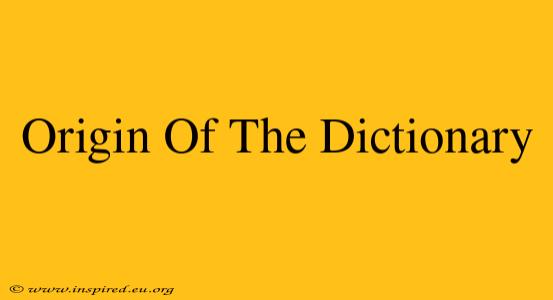The dictionary, that seemingly ubiquitous tome of words and their meanings, boasts a history far richer and more unexpected than you might imagine. Its evolution is a fascinating journey reflecting humanity's enduring need to understand and codify language. We'll delve into the surprising origins of the dictionary, tracing its development from ancient cuneiform tablets to the digital behemoths of today.
Ancient Precursors: Ordering the Chaos of Language
While the modern dictionary as we know it is a relatively recent invention, the impulse to organize and explain language stretches back millennia. The earliest precursors weren't dictionaries in the traditional sense, but they served a similar purpose: providing a structured understanding of words and their meanings.
Cuneiform Tablets and Early Lexicons:
Some of the earliest examples of lexicographical efforts come from ancient Mesopotamia. Cuneiform tablets, dating back to the third millennium BCE, contained lists of Sumerian words and their Akkadian equivalents. These weren't comprehensive dictionaries, but they represented crucial early attempts at cross-linguistic translation and word definition. Think of them as rudimentary bilingual glossaries.
The Greeks and the Quest for Understanding:
Ancient Greece witnessed a blossoming of lexicographical activity. While not quite dictionaries in the modern sense, works like the Onomasticon by Julius Pollux provided detailed explanations of words and phrases, often within specific contexts. These works reveal a growing interest in linguistic analysis and a desire to understand the nuances of language.
The Birth of the Modern Dictionary: Defining 'Dictionary'
The path to the modern dictionary involved several key milestones and contributions. It wasn't a single invention, but rather a gradual evolution driven by a growing need for standardized language and reliable information.
Early Latin and Greek Lexicons:
Latin lexicography developed alongside the Roman Empire's growth. Early dictionaries primarily focused on explaining difficult or obscure words from classical literature. These efforts laid the groundwork for future lexicographical endeavors, establishing basic principles of definition and organization.
The First Printed Dictionaries:
The invention of the printing press dramatically accelerated the creation and dissemination of dictionaries. One of the earliest printed dictionaries, Vocabularium, appeared in the 15th century. It marked a significant shift, enabling wider access to lexicographical resources and facilitating the standardization of language across regions.
The Impact of the Renaissance and Enlightenment:
The Renaissance and Enlightenment periods witnessed a surge in lexicographical projects. Scholars devoted themselves to compiling comprehensive dictionaries, aiming to capture the richness and complexity of languages like English and French. These dictionaries often reflected prevailing social and intellectual attitudes, shaping linguistic norms and usage.
Key Figures in Dictionary History:
Several individuals played pivotal roles in shaping the dictionary's trajectory. Their efforts, fueled by scholarly passion and a dedication to linguistic clarity, profoundly impacted the development of the modern dictionary.
- Robert Cawdrey (1604): His Table Alphabeticall, often considered the first English dictionary, laid the foundation for subsequent efforts.
- Samuel Johnson (1755): Johnson's A Dictionary of the English Language remains a landmark achievement, influencing English lexicography for generations. Its depth and comprehensiveness set a new standard for dictionary-making.
- Noah Webster (1828): Webster's An American Dictionary of the English Language championed American spellings and usage, solidifying the distinct character of American English.
The Dictionary Today: From Print to Digital
Today, the dictionary has transcended its printed form, embracing the digital age. Online dictionaries offer instant access to vast amounts of linguistic data, including definitions, synonyms, antonyms, etymologies, and pronunciation guides. These digital resources have democratized access to dictionaries, making them readily available to anyone with an internet connection.
The Future of Dictionaries:
The dictionary continues to evolve, adapting to the dynamic nature of language. New words and meanings constantly emerge, requiring lexicographers to remain vigilant and responsive. Digital dictionaries, with their capacity for constant updating, are ideally suited to this ongoing evolution.
Conclusion: A Legacy of Language
The journey of the dictionary, from ancient clay tablets to today's dynamic digital resources, is a remarkable testament to humanity's enduring fascination with language. It highlights our fundamental need to understand, organize, and share the complexities of communication. The dictionary remains a vital tool for understanding language, preserving its richness, and facilitating effective communication across generations.
